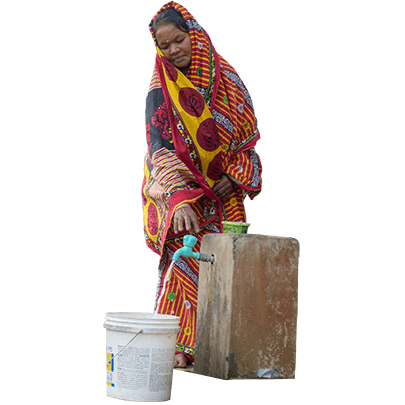Holistic Rural Development Programme in Nayagarh district
The 'Holistic Rural Development Programme' seeks to bring about dignified and healthy living among the rural communities and strengthen community self-governance. This will be achieved through simultaneous interventions in natural resource management, agriculture, livelihoods; social awareness, health, education; water, sanitation, infrastructure development; and leadership training for women self help groups (SHGs). The programme in 17 villages of Nayagarh district reached 3605 households, 24% of which have no operational land holding.
Specifically in water, the project aims to ensure drinking water supply to villages, mitigate the diseases burden due to water contamination and save time and reduce the drudgery of women due to fetching water.

REACH
3605 households, 17 villages
REGION
Nayagarh in Odisha
PROJECT STATUS
Completed
TIMELINE
October 2017 to December 2021
BUDGET
₹9 crore
PARTNERS
HDFC Bank Parivartan
ACTIVITIES
- Provision of overhead water tank for water storage and distribution with adequate water purification measures
- Construction of sanitary well, platform and manual lifting system to ensure a safe source of drinking water
- Community awareness sessions on water
- Construction of model household level toilets and bathing room units
- Solar street lighting, construction of sanitary dug well, platform and manual lifting system; lift irrigation from the river
- Strengthening school children’s parliament, health and hygiene awareness and constructing toilets in schools
- Working with Gaon Kalyan Samiti for adoption of Total Sanitation, capacity building of ASHA & Anganwadi workers, first aid training; domestic health awareness and education camps
RESULTS
- 5 villages with 586 households have built toilets and bathing rooms ensuring 100% Open Defecation Free villages.
- 5 villages have built a piped water supply system, where all 586 households receive water through three taps with access points at toilets, bathroom and the kitchen.
- Pond renovation yielded 54% more water storage and clean pond area for social uses.
- Water Quality Monitoring mechanism set up in 17 villages where trained Village level Cadres work closely with the Village Development Committees to achieve this.
- A Community-managed Water Quality Lab – SUJAL, established in Ikiri village, serves 32 peripheral villages with low-cost water quality testing.